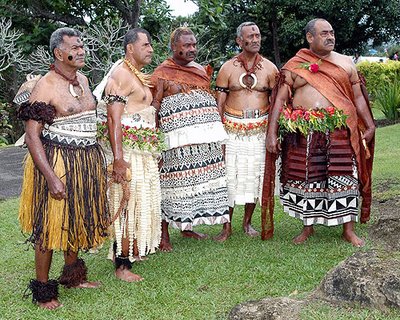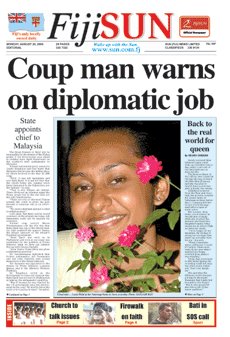 Burning wreck on Suva's horizon.
Burning wreck on Suva's horizon.The Lands Tribunal and Qoliqoli Bills in Parliament will undoubtedly open up a can of worms with respect to the lease of prime real estate in Fiji.
Fiji Island Business presents a
balanced view of the matter.
The Hotel industry in Fiji enjoys the cream of these water front properties in Fiji and will have to begin sharing the pie of economic prosperity. Although the slice is smaller, having something is better than nothing at all.
1987 Coup Leader, former Fiji P.M Sitiveni Rabuka proposes the
abolishment of the chiefly system in Fiji in the midst of his
court case hearings. A radical undertaking in itself, that may require more thought but
S.i.F.M believes in the urgent deconstruction analysis of the Great Council of Chiefs after the involvement of the current chairman in the Ba Holdings Ltd. hostile takeover recently.
 Pic above: Burebasaga chiefs pose before the traditional welcome ceremony of Princess Anne, during her royal visit to Fiji in July 2006.
Pic above: Burebasaga chiefs pose before the traditional welcome ceremony of Princess Anne, during her royal visit to Fiji in July 2006.The other contenscious Media Broadcast Bill has been raised by the media industry in Fiji with their funded organization, Fiji Media Council trying to raise enough support for a campaign like seen in the opposition to the initial tabling of the R.T.U Bill.
Reference documents:
Title IX (PDF)- Media Broadcast
Bill architects.(PDF)
This is an excerpt from the Pacific Islands Media Association(P.I.N.A) submission to the select committee.
PINA's comment:
Monday, August 21, 2006
The Chairman
Sector Standing Committee on Administrative Services
Parliament House
Veiuto
Suva
Attention: Committee Secretary (Kalo)
Dear Sir
The Pacific Island News Association (PINA) wishes to comment, as invited, on the Broadcast Licensing Bill, presently under consideration.
Thank you for the opportunity to have our say on this issue of importance to all of the people of Fiji and the Pacific Region.
Our concerns revolve, for the most part around the media freedom issues inherent in the matter under discussion. PINA is committed to the preservation of Media Freedom everywhere and in particular in the Pacific.
Specifically our concerns are:
The Bill would provide the Minister for Information and Communications in Fiji with remarkable power to control the make up of the authority, the programming
advertising and technical codes.
The Minister would appoint (and remove) the members of the Authority. The Minister would have the power to formulate policy and give policy directions. The Minster would appoint the Secretary of the Authority. The Complaints Committee would necessarily consult the Ministry.
The Minister would make regulations without necessarily consulting the Authority
The Minister would determine the allowances paid to Authority members. The Minister will; formulate policies relating to broadcasting and give general and specific policy direction to broadcasters
S.i.F.M agrees with the general requirements of division of powers; that would make the proposed Media Broadcast authority independent of the Fiji Government. The E.M spectrum should be managed by a Government department agency like U.S Federal Communications Commission.This spectrum management authority is responsible for assigning a frequency's upper and lower limits for which communication equipment to operate in as well as defining the electronic envelope which the broadcast media should not violate.
Wall Street Journal has in interesting article on the developments in HD TV and the use of Digital spectrum in TV broadcasting. Fiji T.V signal is in Analog format. What if Fiji T.V suddenly decided to change to a digital signal without notifying anyone? Chaos would erupt in the spectrum.
Each of these areas on its own would be sufficient for PINA to wish to comment. Taken as a group they are sweeping controls that would have a remarkably deleterious affect on broadcast media in Fiji and as a consequence on Media Freedom in the country. Freedom would be at the convenience of the Minister.
Not necessarily. Freedom of Specch is still guaranteed under the 1997 constitution.
The Authority, as supervised by the Minister, would develop an Advertising Code and a Programming Code and would oversee the implementation of the codes. These codes already exist and work well under the Media Council of Fiji’s administration.
Other countries have Advertising Council working hand-in-hand with their own media legislations. Fiji Media Council's terms of reference does not specifically deal with advertising in print, radio or T.V. Neither does it set out any standard of how advertisers ply their trade.
This fight about advertising standards is really an attempt by Fiji Media Council to justify their existence. Clearly the Advertising standards cannot be created by the media industry, which is analogous to the premise of 'the fox guarding the hen house'.
That is why the advertising standards organization should be clearly demarcated from the overall media industry affiliated organizations like Fiji Media Council.
Currently Fiji media enjoys this mish mash of pliable interests, that really does not listen anybody except themselves with respect to content.
If we were to analyse the role of Fiji media before the 2000 coup in Fiji, they were as guilty of fanning the flames of prejudice and nationalism as the coupsters. This fact is well documented with independent research that is often embarrasing to the Fiji media at large.

When the tensions between the Fiji Army Commander and the Fiji Government erupted, it resulted in the firing of Radio Fiji announcer Mr. Sitiveni Ratulala by the R.F Management.
(Note by S.i.F.M:
The actions undertaken by Fiji Broadcasting Commission Ltd with the famed radio announcer Messr Ratulala actually violates some of their own postulates outlined in page 5 of their submission for the Broadcast Bill).
[This is the excerpt of the F.B.C.L's submission. Links to the official submissions by media industry at the end of the posting.]
Media ownership is a public trust. This means that whoever owns a media organization does so on behalf of the people and should therefore not use it to destroy any individual or group. This also means that the government must stop its practice of regarding the media as mere propaganda instruments to disseminate only information favoured or favourable to it.
.
Whilst the so called media freedom advocates in Fiji remained sqeaky silent in their ivory towers and glossed over any concern of editorial censorship.
It is time that the media in Fiji get a taste of their own medicine. What goes around, comes around.
This is demonstrated by the numerous complaints about the content of Fiji T.V music videos and the apparent lack of educational broadcasts that could benefit rural communities.
The deliberations in Fiji Parliament should be covered by an independent unit(co-financed between industry players and Government). This is to ensure the all media networks contribute towards nation building by using their spectrum to televise the Parliamentry debates.
U.S created that seperate non-partisan news agency called C-SPAN that just gives the facts without advertising. During times when Fiji Parliament is not in session, alternative and appropriate community empowerment programs should fill the time slot and channel.
Fiji cannot rely solely on the media to motivate themselves to undertake this task. If the digital divide is to ever be bridged in Fiji, the media industry has to adhere to new objectives and not a self imposed agenda.>
>Each of these conditions is vital to any commercial
>broadcaster and reflects directly on the costs of that
>broadcaster. Some commercial broadcasters are listed
>companies on the South Pacific Stock Exchange and as
>such have obligations to their shareholders and to the
>stock exchange system. These proposed regulations
>would fly directly in the face of the necessary
>business activities of these listed broadcasters and
>whether listed or not, each commercial broadcaster
>must make a return on the investment made to establish
>the business.
>
>Such regulations work against the necessary business
>activities of commercial broadcasters
>
>
>
>Cross media Ownership
>
>Further the media cross ownership issues would be
>determined by the terms of the Broadcast Licensing
>Bill as and when it became an Act.
>
>It is PINA’s view that cross media ownership in this
>modern world is an issue that should be separately
>deliberated upon and many other factors should be
>considered – where does the internet fit, how will the
>management of spectrum affect all of the parties
>interested in their use to the benefit of the
>community.
>
>Spectrum management
>
>As we understand the plan, there would be one group of
>Authority responsible for administering Broadcast
>spectrum and another assigned to the management of the
>rest of the spectrum. Surely it will be simplest and
>most cost effective to have one over all authority
>handle the administration of the entire spectrum.
>
>Further, there is underway at this very moment, a
>review of the telecommunications system in Fiji.
>Surely this matter should be resolved before any
>further licensing restriction is imposed.
>
>
>Advertising Code
>
>PINA fails to understand why the bill would impose
>restrictions on the content of advertising to the
>extent that the bill proposes.
>
>Why restrict the advertising of prescription
>medicines? These are advertised widely in North
>American broadcast systems.
Pharmerceutical advertising is a closing window in the U.S. It also irresponsible to air commercials for products that permanently affect anyones health. Fiji does not have a support system of pharmerceutical researchers who can validate the claims of the drug's manufacturer. Remembering those who have money will buy out the media and silence counter argurments. Comparing the advertising content in the U.S and Fiji and not the standards framework is a hypocritical stance employed the Fiji Media.>
>Present licenses allow the advertising of alcoholic
>beverages – why impose restrictions?
Concern for minors as well as setting a good example. Not to glamorize the consumption of alcohol.Click to read Canada's Advertising Code. New Zealand has their own
Advertising Standards organization.
So does Australia. Here is an example of advertising standards
working in favor of Fiji as a nation.
This webpage(click here) illustrates the arena of advertising bench marks.
>
>The Authority would set the number of hours which a
>broadcaster would broadcast, set local content
>requirements, specify the number of repeat broadcasts
>and set the language in which the broadcaster would
>broadcast.
It is more prudent and wise to have an independent agency to set out these bench marks to isolate political interference. That does not mean the concept should be ruled out altogether.
How many Rugby fans who watch international matches on local Fiji T.V and are bombarded with the mono-version of a commercial produced by the company. To turn the screw in further and make fans more furious, the same version of the commercial is played back to back at every possible convenience to the media company. That would fit the definition of hypnotic and mind altering programming.
This is the pinnacle of irresponsible media standards.
The same media industry in Fiji who cut their operating costs by NOT producing alternative versions of any company's commercial. So that the media company can rotate the air-time between the 3-4 different versions of the advertisement.
That is the standard of advertising which the media industry in Fiji are basically ignoring.
Furthermore political advertising is a subject not even covered adequately with Fiji Media Council, along with politial fundraisng legislations.
>
>Audiences determine what they will or will not watch.
That cannot really be tolerated in Fiji simply because there are no other alternatives in the media to begin with. That is why the programming code is a good idea to keep the media active.
>The amount of advertising permitted will be determined
>by the audience by way of their “remote” switch. Why
>regulate it?
Those hastily manufactured generalizations by Fiji media representatives need to be scruntinized by an independent 3rd party with no links whatsoever to media industry. Certainly anything produced by any media group requires more than a grain of salt.
>
>Broadcasters make an important contribution to
>election coverage in the country. Why should political
>parties or candidates be restricted from advertising
>as long as the party is identified?
Political advertising should not swayed towards those with money.
>
>The result of such a restriction would be severe
>cutbacks on expensive election coverage and a negative
>affect on the prospects of a political party in a
>modern democracy.
No it doesn't. It makes the advertising companies more responsible to identify who the funders of the media advertising are.
>Programming Code
>
>All of the components of the potential programming
>codes are presently covered in the Fiji Media Council
>Code of Ethics and Practice.
>
>There is no need to change the system so that all of
>what a broadcaster does becomes subject to the
>jurisdiction of the courts as proposed to the less
>obtrusive and less costly present system.
Fiji Courts are basically operating blindly without any bench marks. This is the basic objective of laws. To project the current judiciary legal quandary: if or when a broadcaster violates a non-existant code- there is NO datum of law to refer to. A classic example of a flawed 'straw man' argurement.
>
>Our preference would be to endorse and strengthen the
>Fiji Media Council system and require that all
>broadcasters become members of the Council along with
>all other media. The Ministry of Information and
>Communication is already represented on the Fiji Media
>Council.
This is the biggest flaw that the media industry try to claim.
Fiji Media Council cannot be used as a 'one size fits all' type of jurisdiction.
It is prudent to separate the media council, the advertisng council and the spectrum management in Fiji. So ideally Government does not control it nor does the media industry.
The self-regulation model hyped by the Fiji media is an example of circular logic used in abundance without any independent fact checking.>
>There are many concerns in this proposed legislation
>for PINA – but the main one is the restriction on
>Media Freedom.
>
>It is our preference, while recognizing the need that
>spectrum is effectively managed, that this be done
>without the considerable restrictions revealed in the
>proposed Broadcast Licensing Bill.
>
>Yours sincerely
>
>
>Ken Clark
>President
>PINA
One last issue, Fiji is considered one large market instead of several smaller units joined togther. The market in urban cities are clearly a different audience than rural dwellers.
To date no media freedom advocate recognised this as an issue.
Local means local. Local content in urban setting in Fiji does not constitute local programming in rural areas. This means the differing markets require different styles to the broadcast, a fact that most media outlets in Fiji just sweep under the rug.Furthermore the Title IX submission does not effectively ward off the need for a media broadcast law but actively welcomes it. It also recognises the present Ad-Hoc situation that Fiji media enjoys and often paints an over zealous depiction of the new legislations.ARTICLE 19 welcomes the fact that the Fijian government is moving forward with this longoverdue initiative to put in place comprehensive broadcast legislation and to put broadcast regulation in the hands of an independent body, instead of a ministry, and to set clear rules for licensing.
This is a key element of democratic media oversight and it reflects the practice in other democracies. Until now, broadcast regulation and, in particular, licensing, in Fiji has been conducted in an ad hoc manner, in the absence of clear guiding rules, and by the government.
This has resulted in a patchwork of often unclear licenses, which normally contain no or only very minimal public interest conditions.
Official Submissions(PDF) to the new Broadcast standards Bill.
Fiji TimesFiji Broadcasting Commission LimitedCommunications Fiji LimitedFiji T.V 1.
Fiji SunPacific Islands News Association(PINA)Fiji Law Society.

















